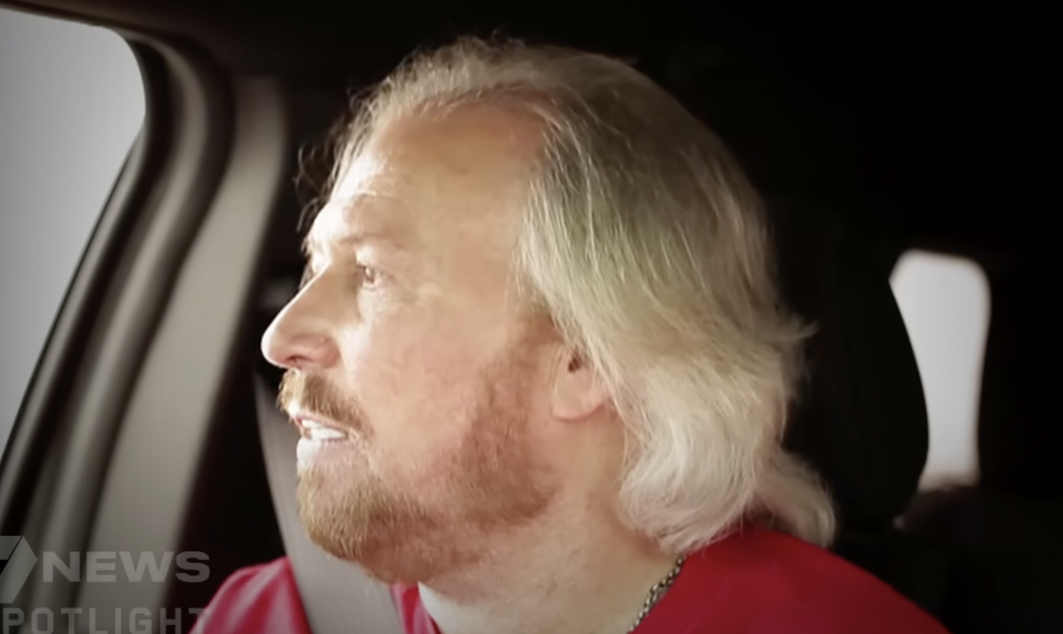
The Last BeeGee’s Heartfelt Confessions: Barry Gibb Opens Up After Losing His Brothers
In a poignant interview, The Last BeeGee: Barry Gibb’s emotional first interview following Robin’s death | 7NEWS Spotlight – YouTube, Barry Gibb offers a raw and intimate look into his life, the incredible journey of the Bee Gees, and the profound pain of outliving his three brothers. Far from the glitz and glamour of their global superstardom, Gibb reveals a man grappling with loss, reflecting on a complex family dynamic, and finding solace in music and family.
The interview, born from a deeply personal place, even inspired a new song, “The End of the Rainbow,” a tribute to his late brother Robin. The lyrics, “Today is tomorrow, winters are summers, and the end of the rainbow is here,” speak to a sense of finding peace and appreciating the present. Gibb reflects on advising Robin to simply “stop, sit down and enjoy” the fruits of their labor, a sentiment heavy with the wisdom of hindsight and loss.
The colossal success of the Bee Gees, while bringing immense joy, was also intertwined with significant pain. Gibb candidly shares his greatest regret: that every brother he lost was during a period of conflict or strained relations. This burden of not being on good terms in those final moments is a palpable sorrow he carries. Being the “last man standing” is a reality he struggles to comprehend, especially as the eldest brother.
The journey began in humble circumstances. Gibb recounts their impoverished beginnings in Manchester, England, and their move to Redcliffe, Australia, as “ten pound poms” in 1958, seeking a better life. He speaks fondly of his time growing up in Australia, calling it “my country” and the place “where my heart is, that’s where my art is.” The early days were filled with a shared dream of fame, fueled by youthful ambition and a playful spirit. Gibb humorously recalls their use of tin cans on broom handles as makeshift microphones, a testament to their early passion.
Ambition eventually led them to London, where they were signed by the management team behind The Beatles. Legendary promoter Robert Stigwood strategically released their first single anonymously in America, leading many to believe it was The Beatles, a clever tactic that generated significant buzz. Gibb also touches on the inspiration behind their hit “Massachusetts,” a song written about the flower power era, serving as a commentary on its transient nature.
The interview delves into their father’s influence, particularly his insistence that they always smile on stage. Gibb notes that their father, a vulnerable man who struggled to show emotion, rarely offered praise, which in turn drove them to constantly seek acceptance and work harder.
A significant turning point came in the mid-70s when they relocated to Miami, just as the disco era exploded. This move reignited their career, propelling them into a whirlwind of global fame. Gibb describes this period as living in a “bubble,” being at the epicenter of a storm of popularity, where thousands of fans would clamor around them. He touches on their songwriting process, often starting with the melody and allowing it to “ferment” before crafting the lyrics.
Their success was so immense that they “weren’t in the charts, they were the charts,” holding multiple top ten hits simultaneously. Gibb also found success as a songwriter for other artists, including working with the legendary Barbra Streisand, who he describes with a mix of affection and fear due to her passionate temperament.
The iconic Bee Gees falsetto, a defining element of their sound, was a natural discovery that stemmed from trying to hit high notes. It became their signature, leading to a string of number one hits. Gibb reflects on Robin’s intense desire for success, which he believes was Robin’s driving force. For Barry, however, avoiding the feeling of having “made it” was crucial to staying grounded and humble, recognizing that everything in life is temporary.
Gibb also shares poignant memories of his friendship with Michael Jackson, recalling lighthearted moments and Jackson’s playful paranoia about others wanting his music.
Despite the professional accolades, Gibb considers his family his greatest achievement – his children and grandchildren – recognizing the tangible reality of those relationships. His enduring marriage of 45 years to his wife Linda is a testament to their bond, built on shared laughter and mutual support.
The deep, almost telepathic connection between the Gibb brothers is a recurring theme. Barry emphasizes that only the three of them truly understood their bond, a “unifying thing” that made them feel like “one person” with a shared dream. This is what he misses most. He speaks with sorrow about the deaths of his younger brothers, Andy in 1988 and Maurice in 2003, the latter passing unexpectedly within 48 hours of falling ill. Robin’s death four months prior to the interview was different; Barry sensed something was wrong but acknowledges Robin’s private nature regarding his health struggles.
Returning to Australia for a tour, Barry plans to share his music, home movies, and stories, including tales from his childhood in Redcliffe. He recounts a pivotal moment there where he and his brothers decided to abandon a path towards petty crime and instead pursue fame. A walkway in Redcliffe will be named in honor of the Bee Gees, a touching tribute that Gibb admits was overwhelming to witness, especially as it solidified the reality of his brothers’ absence.
Performing on stage now is a different experience, but Barry feels his brothers’ presence alongside him through the music and shared memories. He acknowledges that they had their disagreements, as all families do, but the fun they had together was immense. The interview serves as a cathartic experience for Gibb, allowing him to “unload a lot of those emotions” that he hadn’t fully processed since Robin’s passing.